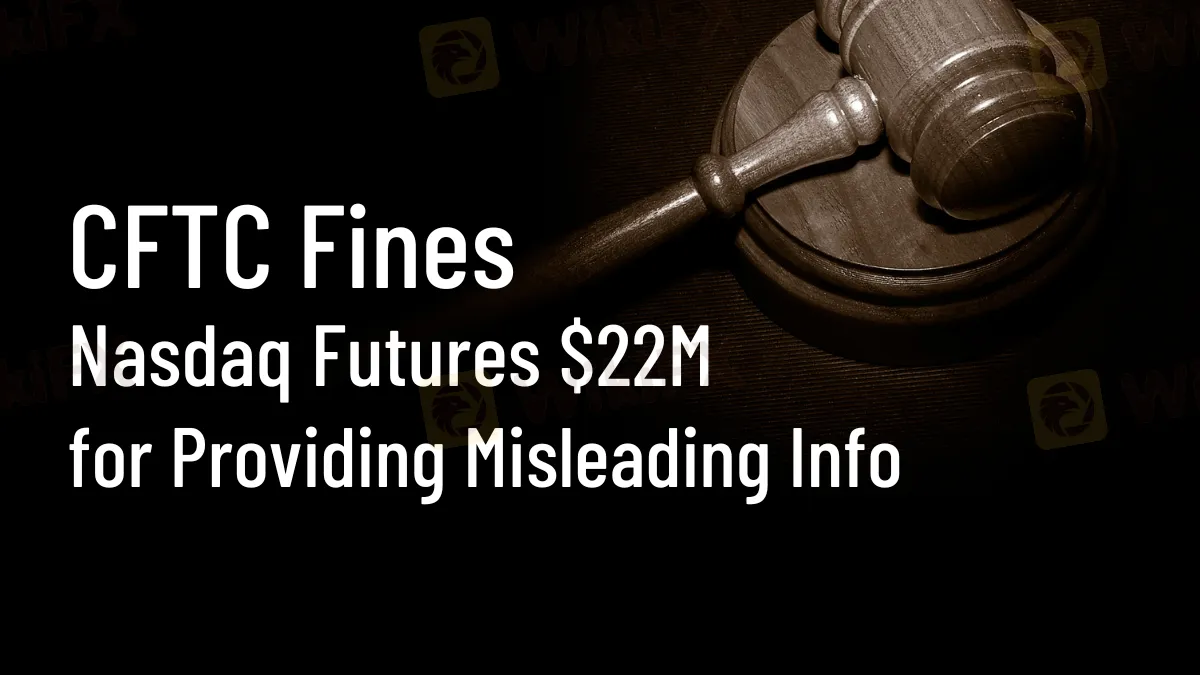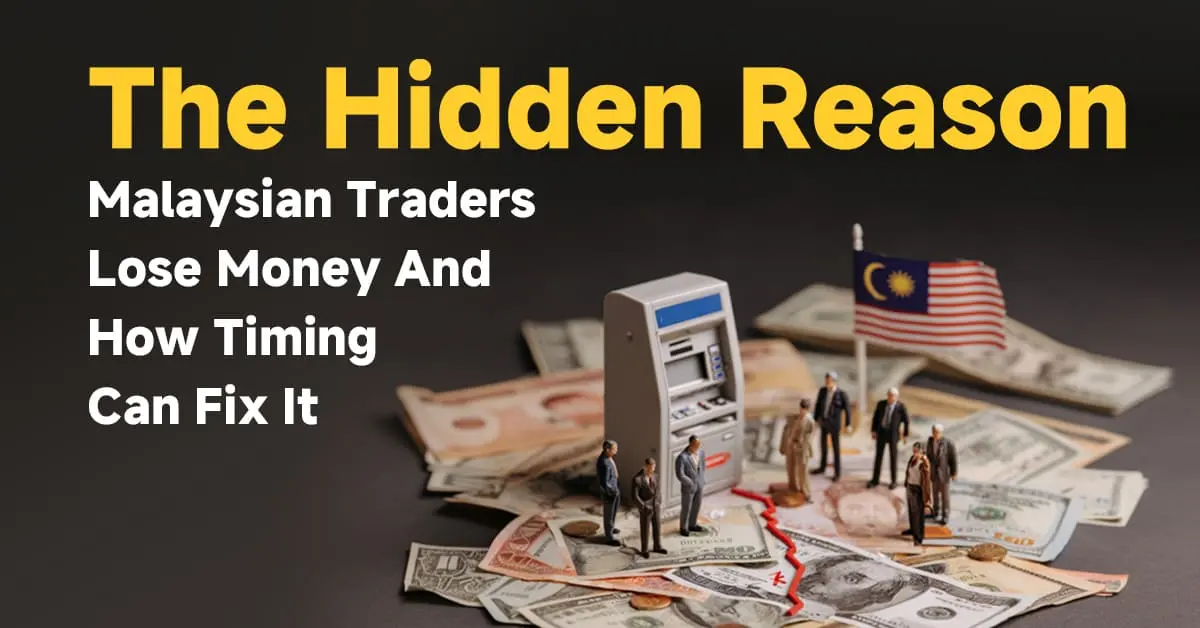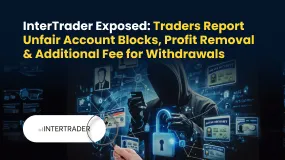简体中文
繁體中文
English
Pусский
日本語
ภาษาไทย
Tiếng Việt
Bahasa Indonesia
Español
हिन्दी
Filippiiniläinen
Français
Deutsch
Português
Türkçe
한국어
العربية
CFTC Fines Nasdaq Futures $22M for Providing Misleading Info
Abstract:CFTC fines Nasdaq Futures $22M for providing misleading info and violating Core Principles. This penalty underscores the importance of transparency in financial markets.

Washington, DC - The Commodity Futures Trading Commission (CFTC) fined Nasdaq Futures, Inc. $22 million, a former designated contract market (DCM). The penalty is the result of the company's failure to disclose important data about its incentive programs to both the CFTC and the public, as well as submitting incorrect and misleading information to the regulatory body. This fine emphasizes the CFTC's strict regulation of market activities as well as the value of openness in the financial sector.
Violation of Core Principles
The CFTC's inquiry showed that Nasdaq Futures, Inc. failed to create, monitor, or enforce regulations governing an incentive program given to select traders on its platform. The Commodity Exchange Act (CEA) requires DCMs, such as Nasdaq Futures, to follow specified Core Principles aimed at maintaining market integrity and safeguarding participants. Among these principles is the duty to provide the CFTC, market participants, and the general public with accurate and full information.
Nasdaq Futures, Inc. failed in this respect by failing to disclose all aspects of its incentive scheme. In particular, the business did not notify the CFTC about a volume-based component of its “Designated Market Maker” (DMM) program. This component provides extra payouts to specific participants depending on the overall amount of contracts exchanged, a critical fact that was concealed in CFTC communications.
False and Misleading Statements
Nasdaq Futures, Inc., was a DCM that specialized in energy commodity futures contracts between July 2015 and July 2018. During this time, the business launched a number of incentive schemes, including the DMM program, which paid a set monthly stipend to market makers to boost market liquidity. However, the CFTC was purposely kept unaware of the existence of a volume-based incentive inside this scheme.

According to the CFTC's ruling, Nasdaq Futures, Inc. provided incorrect and misleading information concerning the DMM program. When questioned by CFTC officials, workers consistently denied the existence of volume-based incentives despite the fact that such payments were given to some program participants. These practices violated the CEA and undercut the CFTC's expectation of trust and openness from regulated firms.
Regulatory Oversight and Compliance Failures
The CFTC's ruling also cited Nasdaq Futures, Inc.'s failure to follow regulatory service provider guidelines. The corporation was instructed to contact three DMM program members about a particular trading activity, but it did not do so and did not record the reasons for its decision. This lapse added to the breaches of other DCM Core Principles.
CFTC Director of Enforcement Ian McGinley underscored the gravity of the infractions, adding, “The CFTC's oversight regime is dependent on CFTC-designated exchanges providing accurate information to the CFTC and market participants.” Nasdaq Futures, Inc.'s actions here constitute severe breaches of both its responsibility to furnish such information and multiple statutory Core Principles applicable to CFTC-designated exchanges.
Consequences and Industry Impact
The $22 million civil monetary penalty issued on Nasdaq Futures, Inc. exemplifies the repercussions of failing to comply with regulatory standards. The CFTC's action emphasizes the significance of openness and correct reporting in ensuring market stability.
This case is keenly watched by the financial sector, as it demonstrates the CFTC's commitment to holding corporations accountable for their activities. The penalties also send a strong message to all market players about the necessity of complying with regulatory requirements and the consequences of non-compliance.
The CFTC expressed gratitude to the National Futures Association for their help in this instance. Brett Shanks, Elsie Robinson, Jeff Le Riche, Brandon Wozniak, Margaret Aisenbrey, Jordon Grimm, Christopher Reed, Charles Marvine, and former Division of Enforcement employee Jo Mettenburg were all engaged in this case.
Conclusion
Nasdaq Futures, Inc. received a $22 million penalty for failing to disclose critical information and making deceptive representations to the CFTC. This case emphasizes the crucial necessity of regulatory compliance and openness in financial markets and confirms the CFTC's responsibility to ensure market stability.
Stay updated on this and other financial news by visiting our WikiFX news page for the latest updates and in-depth coverage.

Disclaimer:
The views in this article only represent the author's personal views, and do not constitute investment advice on this platform. This platform does not guarantee the accuracy, completeness and timeliness of the information in the article, and will not be liable for any loss caused by the use of or reliance on the information in the article.
Read more

Is INGOT Brokers Safe or Scam? Critical 2025 Safety Review & Red Flags
Discover if INGOT Brokers is safe or scam in 2025. Our in-depth review examines their dual licensing, trader complaints, and regulatory warnings to help protect your investments.

The Hidden Reason Malaysian Traders Lose Money And How Timing Can Fix It
In forex trading timing is not just a detail. It is a decisive factor that shapes liquidity volatility and the probability of success.

INGOT Brokers Withdrawal Problems: 2025 User Alert - What You Need to Know
Discover the latest insights about INGOT Brokers withdrawal problems in 2025. Real user experiences, warning signs, and essential information for traders considering this platform.

InterTrader Exposed: Traders Report Unfair Account Blocks, Profit Removal & Additional Fee for Withd
Does InterTrader block your forex trading account, giving inexplicable reasons? Does the broker flag you with latency trading and cancel all your profits? Do you have to pay additional fees for withdrawals? Did the UK-based forex broker fail to recognize the deposit you made? Does the customer service fail to address your trading queries? In this InterTrader review article, we have shared such complaints. Read them out.
WikiFX Broker
Latest News
The Debt-Reduction Playbook: Can Today's Governments Learn From The Past?
FIBO Group Ltd Review 2025: Find out whether FIBO Group Is Legit or Scam?
Is INGOT Brokers Safe or Scam? Critical 2025 Safety Review & Red Flags
The Hidden Reason Malaysian Traders Lose Money And How Timing Can Fix It
InterTrader Exposed: Traders Report Unfair Account Blocks, Profit Removal & Additional Fee for Withd
Germany's "Council Of Economic Experts" Calls For Higher Inheritance Taxes, And Bows To The State
INGOT Brokers Withdrawal Problems: 2025 User Alert - What You Need to Know
Currency Calculator



